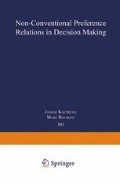Abstract
The standard assumption in the group choice theory states that the individuals in the group have complete (connected) and transitive preference relations over the set of alternatives. In this paper we shall consider some alternatives to this assumption in an effort to find out whether a theory of group choice could be built on non-conventional basic assumptions concerning individual attitudes towards options from which the group has to make a choice. We shall be dealing with a specific class of group choice procedures, viz. voting procedures (VP’s, for short). These are commonly used in determining the “socially best” alternatives either with or without preference ranking between them (for a description and analysis of the VP’s mentioned in this paper, see Nurmi [6] and Riker [8]).
Access this chapter
Tax calculation will be finalised at checkout
Purchases are for personal use only
Preview
Unable to display preview. Download preview PDF.
References
Aizerman, M.A. and Aleskerov, F.T., “Local operators in models of social choice”, Systems & Control Letters 3, 1–6 (1983)
Aizerman, M.A. and Aleskerov, F.T., “Voting operators in the space of choice functions”, California Institute of Technology, Social Science Working Paper 559 (1985)
Fishburn, P.C., “Paradoxes of Voting”, American Political Science Review 68, 537–546 (1974)
Grether, D.M. and Plott, C.R., “Economic theory of choice and the preference reversal phenomenon”, American Economic Review 69, 623–638 (1979)
Kahneman, D. and Tversky, A., “Prospect theory”, Econometrica 47, 263–291 (1979)
Nurmi, H., “Voting procedures: a summary analysis”, British Journal of Political Science 13, 181–208 (1983)
Nurmi, H., “Mathematical models of elections and their relevance for institutional design”, Electoral Studies 5, 167–181 (1986)
Riker, W.H., Liberalism against Populism, San Francisco: W.H. Freeman (1982)
Tullock, G., “Why so much stability?”, Public Choice 37, 189–202 (1981)
Author information
Authors and Affiliations
Editor information
Editors and Affiliations
Rights and permissions
Copyright information
© 1988 Springer-Verlag Berlin Heidelberg
About this chapter
Cite this chapter
Nurmi, H. (1988). Assumptions of Individual Preferences in the Theory of Voting Procedures. In: Kacprzyk, J., Roubens, M. (eds) Non-Conventional Preference Relations in Decision Making. Lecture Notes in Economics and Mathematical Systems, vol 301. Springer, Berlin, Heidelberg. https://doi.org/10.1007/978-3-642-51711-2_11
Download citation
DOI: https://doi.org/10.1007/978-3-642-51711-2_11
Publisher Name: Springer, Berlin, Heidelberg
Print ISBN: 978-3-540-18954-1
Online ISBN: 978-3-642-51711-2
eBook Packages: Springer Book Archive

